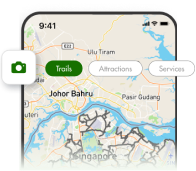Seeds are for sowing purposes, not for consumption.
Nursery stock includes live plants and plant materials (excluding seeds) which are imported for cultivation or propagation purposes. These include:
- Seedlings: Young plants grown from seeds.
- Transplants: Seedlings that have been moved to larger pots to continue growing before being sold.
- Cuttings: Stems or leaves taken from mature plants and encouraged to root and grow into new plants.
- Grafts: Techniques where a desired variety is grafted onto a hardier rootstock for improved growth or disease resistance.
Ornamental plants are plants grown primarily for their aesthetic value. They include:
- Flowering plants
- Foliage plants
- Cacti and succulents
- Trees and shrubs
Obtain a phytosanitary certificate
Phytosanitary certificates are only issued for these purposes:
- Certify that plants, plant products or other regulated articles meet the phytosanitary import requirements of importing countries and conform to the certifying statement.
- Support re-export certification to other countries.
They are normally issued by the authority of agriculture or the National Plant Protection Organization (NPPO) of the country of origin of the plants and plant products.
Additional declarations and treatments applied
If you are importing the following plant types, you will need to ensure they are free from plant pests, but do not need to include the additional declarations in your phytosanitary certificate:
- Plants without growing medium (bare-rooted).
- Seeds for planting (except those which are economic crops)
Find out the additional declarations or pre-export treatment required for the following plant types or refer to the factsheet below for more information.
Plant health requirements factsheet (ornamental plants, nursery stock and seeds) (PDF, 167KB)
This document details Singapore's import requirements for plants with and without growing medium, seeds, tissue culture plants and mushroom spawn.
Aug 2025
Your phytosanitary certificate must include an additional declaration that your plant is free from plant parasitic nematode (PPN).
If the additional declaration is not available, your plant must be treated with nematicide treatment and be endorsed on the phytosanitary certificate.
Your mushroom spawn must receive one of the following treatments:
Your phytosanitary certificate must include an additional declaration that the parental stock is indexed against the presence of the major quarantine viruses.
Who to contact
Your supplier must arrange for the exporting country's authority of agriculture or National Plant Protection Organisation (NPPO) to inspect the ornamental plants, nursery stocks, or seeds you want to import into Singapore. The phytosanitary certificate will be issued if the plants meet Singapore's import conditions.
Traveller's allowance
You do not need to obtain a phytosanitary certificate and import permit if you are hand-carrying the following quantities of plants or plant products per person from West Malaysia:
- 3 non-CITES listed plants without potting media.
- 250 grams of seeds.
Any excess quantity for imports from West Malaysia or imports from the rest of the world will be detained by the Immigration & Checkpoints Authority (ICA) or Singapore Customs officer if you do not have valid documentation.
Accredited nurseries from Malaysia
If you want to import plants from Malaysia, you may refer to the list of accredited nurseries under the Department of Agriculture of Malaysia below.
List of accredited nurseries under the Department of Agriculture Malaysia (PDF, 168KB)
Contact information of the accredited nurseries managed under the Malaysian Phytosanitary Certification Assurance (MPCA) scheme.
Oct 2025
These accredited nurseries are managed under the Malaysian Phytosanitary Certification Assurance (MPCA) scheme. Import from these MPCA nurseries needs to fulfil Singapore’s import conditions.
The traveller's allowance still applies if you are importing from these nurseries.
After receiving your phytosanitary certificate
After receiving your phytosanitary certificate, you will have to apply for an import permit before you can bring your plant or plant product into Singapore.






